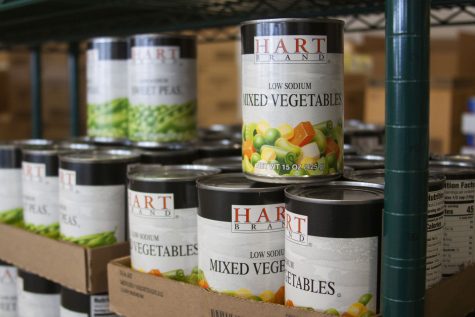Opinion | Universal free-lunch programs are overdue
The pandemic-era policy for universal free-lunch has expired, but the need is still there.
July 26, 2022
Proper nutrition is an essential need for growing bodies.
But accessible nutrition is no longer a promise. On June 30, the pandemic-era program that provided universal-free lunches for all students in public schools ended.
Free lunch programs should not only meet the needs of students living in poverty. Nutrition for all students should be guaranteed no matter their economic circumstances.
In March 2020, the U.S. Department of Agriculture announced it would reimburse schools for free breakfast and lunches. This was done in an effort to provide accessible nutrition to students amid school closures in response to the pandemic.
But now that schools are back in person, the program is ending.
The USDA will resume the National School Lunch Program (NSLP) to pre-pandemic operations. This means only students living at or below the poverty line have access to free or reduced-rate lunch.
Before the pandemic, more than half of schoolchildren came from low-income households that qualified for free and reduced-price meals. Schools served about 20 million free lunches every day under the NSLP.
Although students from low-income households still have access to free and reduced lunches, households just above the eligibility requirements must pay for full-price lunches.
Before the pandemic, the USDA spent about $19 billion annually on the NSLP. Under the universal free-lunch program, the USDA spent just $11 billion more.
The U.S. can afford to spend $30 billion annually to ensure every child in public schools has access to adequate nutrition. After all, the U.S. spent more than $700 billion on national defense in 2021.
When Democrats in Congress attempted to extend the universal free-lunch program, Republicans were quick to shut it down.
In response to criticism, an aide to Minority leader Mitch McConnell said McConnell and other Republicans think schools no longer need the pandemic-era provisions, especially as the conditions that made them necessary — such as school closures — have ended.
Assuring the health and nutrition of children should be at the forefront of every policy maker’s mind. This is not a political issue.
Although the free and reduced lunch serves many students living in poverty, it does not cover the greater need for nutrition.
Since March 2020, the Iowa City Community School District has served more than 1.6 million meals to 14,000 students and families. This averages to 9,000 lunch meals and nearly 3,400 breakfast meals a day.
With the current recession, people have struggled to feed their families. For families living just above eligibility requirements, they are now out of luck in receiving free lunches.
California and Maine are currently the only states with universal free-lunch programs. Lawmakers in states such as Massachusetts, Minnesota, Vermont, and New York have introduced universal free-lunch bills.
Although this issue should be addressed at a federal level, as hunger goes beyond state lines, the state needs to take action. Until the federal government steps up and passes a permanent universal free-lunch program, the state of Iowa should establish a universal free-lunch program.
Nutrition is as essential to a child’s growth as math, reading, and science. No household should have to live in poverty to have access to free lunches for their children.
Universal free lunch is not a topical concern, it is a need in the country. All levels of government should take action to ensure every student has access to nutrition.
Columns reflect the opinions of the authors and are not necessarily those of the Editorial Board, The Daily Iowan, or other organizations in which the author may be involved.














